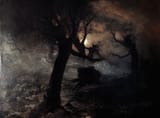Search Results
6/12/2025, 12:26:36 AM
‘Elves’, ‘djinn’, ‘faries’ are essentially the same thing. Even games that try to have elves that are more accurate to the real beliefs like Call of Cthulhu, not just myths but living belief, of elves don’t capture their true power as forces of nature within of themselves. The sickness that people succumb to*, the chaotic winds, the rocks of the land which they were described to live in - they were/are these things as much as they are/were of these things. Even Tolkien you have to remember was inspired by this as the seemingly biological elves of his world actually seem to parallel the believes of European people concerning nature spirits but through symbolic (symbolism is beyond the simplicity of allegory) myth. Undying immortal beings, ethereal, coming from a different land (symbolic for the spirit realm/otherworld/astral?),naturally possessing powers impossible to mortals, beyond mortal comprehension - yet mirroring them and having a shared fate in the divine plan. And Tolkien mentioned that elves became invisible did he not? Now in medieval Christian times there were a variety of beliefs concerning how spirits could be converted to Christianity, and early Christianity had a particular story concerning Satyrs. Elves came to be believed to be neutral angels, who did not pick a side during lucifer’s rebellion and had fallen to the earthly realm or really a liminal space in between, and there were various debates whether they could or could not be redeemed (Wolfram Von Eschenbach denied the possibility to such beings). Now does that not mirror the beliefs of djinn, beings of smokeless fire, being able to become Islamic? Or many categories of spirits being able to take up Buddhism? There is a pattern of beliefs being referenced by Tolkien here. And really, what would be the point of man if elves already existed as being perfect and better, unless you look more deeply into things?
*schubert’s Elf King
*schubert’s Elf King
Page 1
